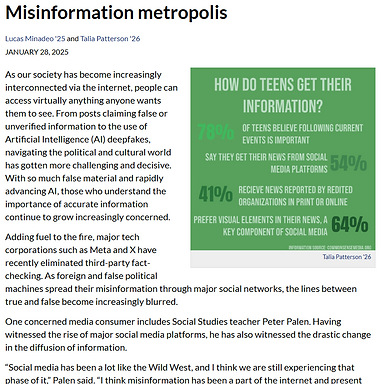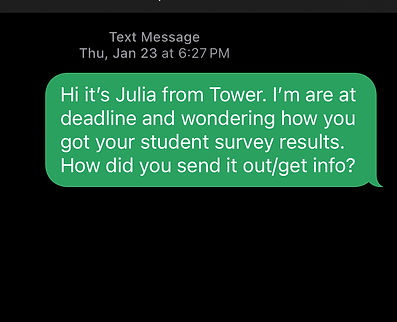top of page
News Literacy
"Whoever would overthrow the liberty of a nation must begin by subduing the freeness of speech." ―Benjamin Franklin.
One of my earliest memories of social studies class in elementary school was learning about the first amendment. Since then, the freedom of press is the clause I have used the most.
"Congress shall make no law respecting an establishment of religion, or prohibiting the free exercise thereof; or abridging the freedom of speech, or of the press; or the right of the people peaceably to assemble, and to petition the Government for a redress of grievances." - The First Amendment
Unbiased Sourcing
When I report on topics in local government, I have to be mindful to give everyone mentioned in the story an opportunity to share their thoughts. This is something that each New York Times reporter has at the bottom of their staff bio. It should be the top concern for any ethical journalist.
In the story that I wrote about the former school board president being investigated, it was top of mind to give all perspectives a chance to be heard. This is a list of everyone I reached out to:
Granted, not everyone responded to me, but I tried to get everyone’s insight to have an unbiased article. This is something I continue to do, especially when I wrote news articles for the Detroit Free Press over the summer.
- The school board member investigated
- The then school board president
-The immediate past interim Superintendent
-A school board member
- Whistleblower
-A high school athletic director in my district
-A high school principal in my district
-Two attorneys from a law firm mentioned in the investigation summary
-Two community members
-Two students
Joining The Tower staff my sophomore year of high school, I was scared to state my political and social opinions into the world. I am now thankful I did not share those opinions, it has served me well as I have become primarily a news writer. There have been many times when I have wanted to write an opinion piece, but have shied away from it.
Unbiased Journalism
“I will quote you warmly and accurately.” - William Miller, a rock critic, said to Russell Hammond, a rock musician, in Almost Famous.
Although this movie is one of my favorites, I do not take advice from it. Journalists should not go into quoting someone with the idea to quote them warmly. I laugh every time I hear this line.
Biased journalism hurts that publication’s credibility. Every time I write a news story, I reread it multiple times to ensure there is no bias in the story. I have multiple people including family members, other editors, and advisors go over the story to ensure there is no bias.
As an editor, there have been multiple times when I have had to sit a writer down and point out their bias. Specifically, there was a story regarding why some teachers post the highest scoring tests on the wall. The first version of the story was clearly written putting the action of posting the tests in a positive light. After sitting with the writer, I pointed out what sections had to be revised.

The colored edits do not reflect the edits I made.
Fact Checking
Every story I edit that has a statistic or cites another publication, I assume it's inaccurate until I validate the data. As an editor, I take fabrication very seriously, as every journalist should. In one instance, there was a story that was minutes away from being published at our deadline meeting. There was a student survey statistic in the piece- which is very rare for staffers to include in articles. No one had questioned the accuracy of the survey, so I reached out to the writers and got confirmation that everything was accurate. In this example, it was thankfully accurate,yet still important to check.


The text that I sent to the staffers that wrote this story.
This was the final published story.
bottom of page